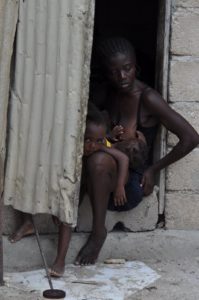Women don’t necessarily want to place their kids in orphanages. It is not what we want for our children, and it is not what poor women want for theirs either. In most cases during the year I worked at an orphanage, the first time a woman came knocking, it was to ask for help. Orphanages are not set up to offer any kind of ongoing financial assistance and jobs in orphanages have maximum capacities, so at a certain point, an orphanage just has to turn these women away. They come back over and over asking for help until they finally do the one thing to help their kids that an orphanage can service.
They give their children away.
They know that they will at least be able to eat every day and have a roof over their heads and they might even get an education. It is often far more than they themselves can offer their children and the burden of the daily cries of hunger from their little ones often becomes too great of a burden to bear. Like a woman on a sinking ship throws her baby into a lifeboat, the poor mothers of this world are giving their children to orphanages all over the world in order to save them.
Because they love them.
And these institutions are being funded by many well-meaning donors who have no idea that they are creating a rescue system for the poor that encourages child abandonment. Would that they North American aid societies and churches put as much emphasis on job creation in their strategies as they do on pictures of skinny children being devoured by flies in their commercial advertisements for funding.
There really and truly are no poor children in this world. Only poor parents.
After all, children weren’t meant to be the providers. If we want to help poor children sustainably, we must focus on their caregivers- the mother and fathers and other adults in their lives and help them find a way to take care of their own. Only in this way, will we be helping in a way that is not taking away the most important person in the child’s life in exchange for a mediocre and damaging existence in an institution.
So, this woman at the gate came knocking several times and I couldn’t help her. I had realized that trying to help with a small startup business wasn’t working at all and besides that, I couldn’t afford to keep shelling out hundreds of dollars at a pop just to have them come back in two weeks and ask for more money. I told her I couldn’t help her. Several times she came back and asked for help and I said no. On about the third or fourth time, she asked if she could leave her daughter. Her daughter’s name was Chrystelle.
What unfolded after that was surreal. She left her daughter at the main house of the orphanage. I lived in the boy’s home- an auxiliary house down the road. Chrystelle was about 3 years old. After her mom dropped her off, she spent several days in the private living quarters of the orphanage director and I remember going over and watching her sitting at the table in a highchair miserable and crying for her mother. There she was, at three years old, abandoned by her mother and with a bunch of white strangers who were speaking another language.
Within 24 hours she had been listed on the “waiting children” website and within 48 hours, she had been matched with a “family” that was going to adopt her. It was the strangest thing to watch transpire. A week and a half ago her mother was banging at my gate asking for help and now her daughter was sitting at the table crying and had been promised to a family in the states with her mugshot online as an orphan. Most of the time this is how it goes down. A family in the states is now overjoyed that God has blessed them with a new child and the opportunity to rescue another orphan.
Meanwhile a broken hearted mother is left marginalized. She is the only one for whom there is no hope or help. She has lost everything. Everything.
For most children, they will then spend several years in the orphanage while their paperwork is being processed and then 3-4 years later, they will go home to their forever families with a heap of emotional baggage from being abandoned and institutionalized and the new families will be left to mop up the pieces of brokenness and hurt that the child has suffered. Often times, the children come home too damaged and unwilling to let themselves be loved again. Many times the children get rehomed or end up in foster care. It is a tragedy that, in my opinion, could have been altogether prevented just by being able to help the mom out at the very beginning. It seems like the aid organizations and churches around the world are just starting to wake up to this idea. But progress is slow, and the old models of charity and orphanage building are hard to break.
In Chrystelle’s case, things got a bit more interesting as I watched from the sidelines.
Her mother loved her very much and after leaving her for a few long weeks in the orphanage, she must have gotten a few things sorted out and she decided to come back for her! It was a fight for sure. The orphanage didn’t want to let Chrystelle go. She has already been promised to a family. How embarrassing really. And besides, how could they know this mother was fit to take care of her child anyways.
What right does a poor mother have to raise her own child anyways? (Please note the sarcasm as I try to highlight the ugly superiority that easily creeps into all of us when it comes to working with poor people). The balance of allowing people their dignity of their human rights in spite of their lack of resources, education, and understanding is the foundation of honoring people. We often can feel like we know better for them and will want to force an outcome that does not respect their decisions. We may even be right. But to allow a person the dignity of choice for the things that they have been entrusted with MUST be our approach in any kind of aid or development situation. We have to stand up for them for their rights to be honored even if they themselves would relinquish those rights with no fight or argument.
Thankfully for Chrystelle’s mother, the laws sided with her. The orphanage had to give her child back and she left with her daughter Chrystelle and I never heard from her or saw her again.
And there was much wailing and gnashing of teeth back at the orphanage and in a home in America for the loss of Chrystelle. Her mother had been invisible to us from the beginning and the child had always been “ours” in our minds. “Our” child had been kidnapped. By the birthparent. I can’t tell you how many times I have heard that statement. I felt like I was living in some twilight zone. How could this be justice. Should we not celebrate for Chyrstelle’s mother?
I think about Chrystelle’s mom. How brave she must have been. Not only to knock so many times to ask for help to no avail at the beginning, but also to get back up on her feet and fight to get her daughter back. A poor small black woman standing at the gate of a bunch of big white strangers who have her daughter and asking for her back, when they see her as a failure and an unfit mother, requires a tremendous amount of guts and courage.
I wish I could have explained the story from start to finish to the “adoptive” parents who were also so clearly wounded by these series of events. Online adoption groups are filled with nasty chatter about stubborn birthparents who don’t do what they are supposed to do for the adoption to go through. Sometimes I wonder if they have any idea of the back story. Surely they would have a paradigm shift if they could know what goes on behind the scenes in the lives of these little families just trying to stay fed and alive.
To be continued……

